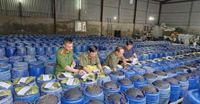On April 18, 2025, the Economic Crime Investigation Department of the Nghe An Provincial Police announced significant developments in a case involving food safety violations. Four individuals have been prosecuted and temporarily detained for their involvement in illegal practices related to food production, specifically concerning the production of bean sprouts.
This operation is part of a broader initiative by the Nghe An Provincial Government, which launched Plan 236/KH-UBND on April 9, 2025, to promote an "Action Month for Food Safety". The aim is to enhance food quality and ensure public health safety across the province.
According to reports, the Economic Crime Investigation Department discovered multiple bean sprout production facilities in the area that were violating food safety regulations. These facilities were found to be using harmful chemicals to increase production yields, significantly raising the risk of health hazards for consumers.
On April 11, 2025, authorities conducted coordinated inspections at four bean sprout production sites located in Vinh City. This operation was carried out with the cooperation of local police units and the Department of Quality, Processing, and Market Development of the Ministry of Agriculture and Rural Development. The inspections led to the successful dismantling of a production ring that had been operating illegally.
The arrested individuals include Luu Manh Huong (32 years old) and Luu Van Trung (28 years old), both from Truc Ninh District in Nam Dinh Province, along with Tran Khac Duy (35 years old) and Nguyen Van Huong (27 years old), residents of Vinh City, Nghe An Province.
During the inspections, authorities seized approximately 2,000 containers filled with about 25 tons of bean sprouts. Additionally, they confiscated 25 liters of a chemical known as "water candy" (scientifically identified as 6-Benzylaminopurine (6-BAP)), along with 150 liters of a diluted solution used in the production process.
The use of 6-Benzylaminopurine is particularly concerning, as it is classified as a banned substance. Health officials warn that exposure to this chemical can lead to severe health issues, including lung fibrosis and potentially fatal outcomes. The investigation revealed that from 2024 until the time of their arrest, the suspects had produced and sold around 3,500 tons of bean sprouts that had been treated with this hazardous chemical.
This case marks a significant milestone for the Nghe An Provincial Police, as it is the first of its kind in the region addressing violations of food safety regulations. The successful operation not only highlights the commitment of local law enforcement to combat food safety violations but also serves as a warning against the dangers of consuming contaminated food products.
In light of these events, the Nghe An Provincial Police have urged the public to remain vigilant and to reject the consumption of substandard food products that may contain harmful chemicals. They emphasize the importance of purchasing food from reputable sources that comply with safety regulations and possess the necessary business licenses.
Authorities recommend that consumers carefully check the origins, expiration dates, and packaging of food products, avoiding any items that appear spoiled, moldy, or lack proper labeling. Additionally, they encourage anyone who witnesses suspicious activities related to food production or sales to report these incidents to the nearest authorities promptly.
The investigation into this production ring is ongoing, with law enforcement agencies committed to expanding their efforts to ensure food safety and protect public health in Nghe An Province.
This crackdown on illegal food production practices underscores the critical need for regulatory compliance in the food industry, as well as the role of consumers in safeguarding their health by making informed choices.
As the authorities continue their work, the community is reminded of the importance of food safety and the potential risks associated with consuming products that do not meet established health standards.




